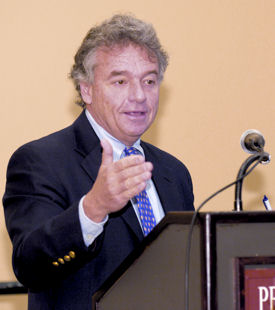Recalls target cold products, digoxin, defibrillators, diet aids
A summary of approvals, recalls, warnings and alerts.
Recalls, label changes
A recall of Influend Cough and Cold products sold on or after May 30, 2008 because they may be more potent than intended. Complications could include tachycardia, palpitations, arrhythmias, cardiovascular collapse with hypotension, dizziness, anxiety, headache and nervousness. Affected products include the 24-tablet Influend Cold and Cough (Lot#800074) and Influend Severe Cold & Flu (Lot# 800075); and the 4-oz. bottle of Influend JR. Cold & Cough (Lot# 800076) and Influend JR. Severe Cold & Flu (Lot# 800077).

A label change for all over-the-counter (OTC) pain relievers and fever reducers to include warnings about potential safety risks, such as internal bleeding and liver damage. Affected products include acetaminophen, NSAIDs, and cold medicines that contain pain relievers and fever reducers.
A boxed warning and Risk Evaluation and Mitigation Strategy (REMS) for all botulinum toxin products due to reports of serious adverse events. Effects of the toxin may spread from the area of injection to other areas of the body, causing symptoms similar to those of botulism, like unexpected loss of strength or muscle weakness, hoarseness or trouble talking, trouble saying words clearly, loss of bladder control, trouble breathing, trouble swallowing, double vision, blurred vision and drooping eyelids. Symptoms have mostly been reported in children with cerebral palsy being treated for muscle spasticity, an unapproved use, but have also been reported in adults treated for approved and unapproved uses.
A U.S. market phase-out of psoriasis drug efalizumab (Raptiva), due to a potential risk to patients of developing progressive multifocal leukoencephalopathy (PML). Physicians shouldn't start patients on new treatment with the drug, and should immediately talk with patients currently using efalizumab about transitioning to alternate therapies.
A recall of Caraco brand digoxin (Lanoxin), USP 0.125 mg and USP 0.25 mg, because the pills may differ in size and contain more or less digoxin than indicated. Patients with renal failure are at particular risk of digoxin toxicity from higher-than-labeled doses; such toxicity can cause nausea, vomiting, dizziness, low blood pressure, cardiac instability, bradycardia and death. Lower-than-labeled doses can result in cardiac instability. The drugs affected by the recall were distributed before March 31, 2009 and are within the expiration date of September 2011.
A class 1 recall of ZOLL AED Plus Defibrillators, because they may fail to deliver a shock. The recall affects devices distributed from May 2004 through February 9, 2009.
A class 1 recall of multiple types of Centurion disposable trays and kits used for insertion of tubes, catheters and ports, due to package sealing that may affect the sterility of the devices. The products were distributed from November 24, 2008 through January 7, 2009.
A recall of libido supplement Libimax because it contains tadalafil, which may interact with nitrates found in some prescription drugs, such as nitroglycerin, and may lower blood pressure to dangerous levels. Patients with diabetes, high blood pressure, high cholesterol, or heart disease often take nitrates, and ED is a common problem in men with these conditions.
A recall of all lots of Personal Care non-acetone nail polish remover, 6 fl. oz., UPC 4815592076, because it may cause chemical burns to the fingers of users.
A recall of dozens of dietary supplements distributed by Universal ABC Beauty Supply International, Inc. because they may contain undeclared sibutramine (Meridia). An appetite suppressant, sibutramine can increase blood pressure and pulse rate and may pose a risk for patients with a history of coronary artery disease, congestive heart failure, arrhythmias or stroke. A list of affected products is online.
Approvals
Golimumab (Simponi), a monthly treatment for moderate-to-severe rheumatoid arthritis, active psoriatic arthritis, and active ankylosing spondylitis. The label includes a boxed warning about the risks for tuberculosis and invasive fungal infections. Side effects may include upper respiratory tract infection, sore throat and nasal congestion.
AVantage A/H5N1 Flu Test, a more rapid test for influenza A/H5N1, which is a subtype of the avian influenza A virus. The test uses throat or nose swabs collected from patients with flu-like symptoms and works in less than 40 minutes, compared to the 3-4 hours of previous tests.
Topiramate, the first generic version of Topamax, to prevent seizures.
Everolimus (Afinitor) oral tablets for patients whose advanced kidney cancer has progressed after treatment with other cancer therapies.
Benzyl Alcohol Lotion, 5%, to treat (head lice) in patients 6 months of age and older. Common side effects of the prescription medication include irritations of the skin, scalp, and eyes, and numbness at the site of application.
Artemether and lumefantrine tablets (Coartem) to treat acute, uncomplicated malaria infections in adults and children weighing at least five kilograms (about 11 pounds). The drug isn't approved to prevent malaria or treat severe malaria. The most common side effects in adults are headache, anorexia, dizziness, physical weakness, joint pain and muscle pain. In children, more common side effects are fever, cough, vomiting, loss of appetite and headache.
IXIARO, the only vaccine in the U.S. for Japanese encephalitis.
Upon submission of a manufacturer's application, levenorgesterel (Plan B) can be marketed without prescription to women age 17 years and older, according to a federal court order.
Miscellaneous
Ceftriaxone (Rocephin) can be used concomitantly with intravenous calcium-containing products in patients older than 28 days. The FDA had warned physicians in 2007 against administering calcium-containing products and ceftriaxone within 48 hours of each other due to a risk for precipitation of ceftriaxone-calcium. Based on the results of two studies, the agency has now determined this risk is low in patients more than 28 days old.



